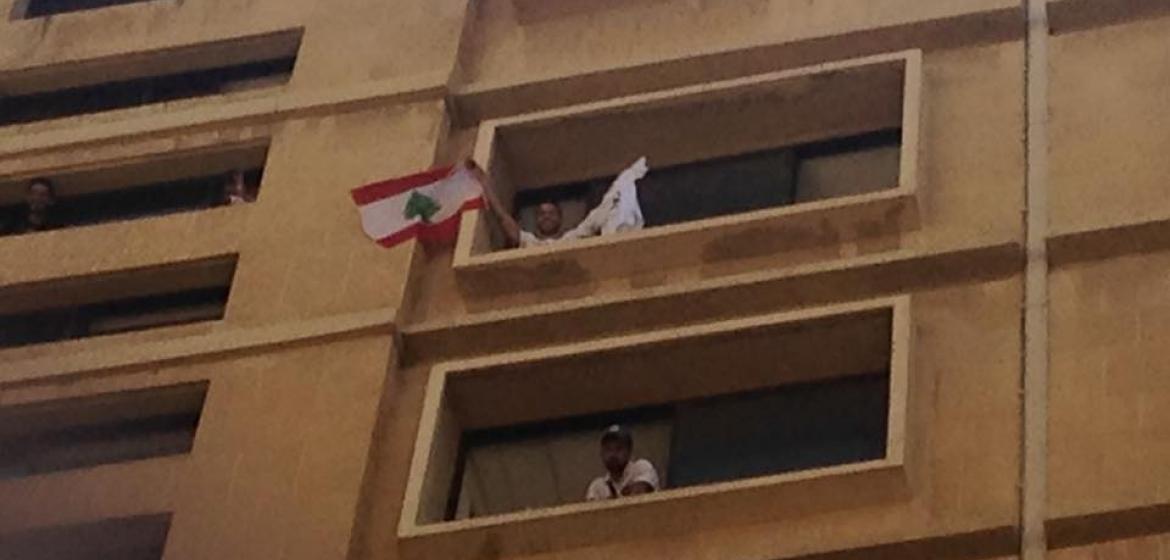In protest of the trash that has been pilling up all over Lebanon since July, a group of young people have started a movement called #YouStink (in Arabic: tolhet rehetkom). The movement has since spurred a big wave of demonstrations. Inass al-Jawari and Tobias Lang spoke to one of the founders of the movement and provide first-hand experiences for us.
On August 23, thousands came face to face with riot police as they descended upon the government’s headquarters, undeterred by the water cannons and tear gas. After the army was called to control the clashes, tanks rolled in. For weeks before, politicians have been unable to decide on where to dump the rubbish piling up in the Lebanese capital since the main landfill in Naameh, south of Beirut, was closed on July 17. The company in charge of picking up the trash, Sukleen, has stopped its services altogether, saying it had no place to dispose garbage anymore.
The built-up frustration is emblematic of a wider political deadlock: Lebanon is engulfed in a crisis of governance, notoriously strained by poor infrastructure and daily electricity cuts. While the parliament is without a mandate since 2013 and postponed the next elections until 2017, citing instability as a reason, the office of the president has been vacant since May 2014, leaving the country without the nominal head of state.
To provide a little further overview, Amir Al Fakih, a co-founder of the #YouStink movement, kindly answered a few questions:
Could you briefly introduce yourself and tell us how you got involved in the movement?
My name is Amir Al Fakih. I am 23 years old. I started the #YouStink movement along with Imad Bazzi, Assaad Thebian and Nadyn Jouny through a Facebook group-chat. On its fourth day, the 21st of July, we went to the streets with 20 of our friends demanding an end of the garbage crisis.
Why are people protesting in Beirut and what exactly are your demands?
Beirut is the heart of Lebanon, its largest city and capital. It contains 50 percent of the population. Now imagine that Beirut had no dumps anymore to take the garbage off the streets – this situation was unbearable.
How did the #YouStink movement come together? Who are the leaders?
As I said it happened through a Facebook thread – there is no leader, rather a core committee made out of ten to eleven people that takes decision.
Why were the protests met with such a violent response by the security forces?
Since the protesters have no political or religious affiliation, we do not get any support from inside the corrupted government. Actually, it’s the first time in our history that people go out to protest without a request from a party, religious group or syndicate. Instead, the call came from a group of youth from different sects and political backgrounds. So I guess the unity in the movement had made the government fear us and face the protests with brutality.
Why do you think the protests have resulted in riots and a destabilization of the government?
Some protesters went out peacefully to shout their needs, others believe that no one will hear their voices and the only way to express anger is through rioting. Everyone has his way. But if the government had not looked down at its people this wouldn’t have happened.
In your opinion, how much influence has your movement among the young Lebanese?
The influence has hit the youth full-on! Many young people have no hope of staying here, so they immigrate. But what happened brought a new hope and some light at the end of the tunnel, a string to hold on to and believe that yes, change is possible. One way or another!
What are your demands from the government?
We have three basic demands: The resignation of Mohammad Mashnouk, the Minister of environment, who was supposed to take care of the garbage crisis and failed. A timely and environmental solution for the issue. And the persecution of those who shot and gave orders to shoot civilians during the protests.
There are rumors of “infiltrators” at Beirut’s YouStink-protests. Is it true that there were thugs loyal to Amal (a mainly Shiite party led by the speaker of the Lebanese Parliament Nabih Berri), as it was reported by media close to March 14?
The media will say what it wants. But yes, Amal tried to send people to end the protests by instigating riots. They believe in violent revolution and we can’t blame them, they are on the line of death and this is how they resist.
Do you fear the movement is hijacked by Hezbollah and Tayyar, the “Free Patriotic Movement” headed by Michel Aoun, to bring down the government and/or force an amendment of the constitution in their favor?
We are aware of those who try to hijack the protests. But we always want to maintain our independence from any political affiliation and against not only all of those who are corrupted, but also those that are silent over the widespread corruption in Lebanon.
Thank you Amir!
Inass Al-Jawari is a student at the University of Bonn. Her dissertation deals with Antisemitism in the Arab world. Tobias Lang is a doctoral candidate at the University of Vienna and author of the blog MENA Minorities.


















